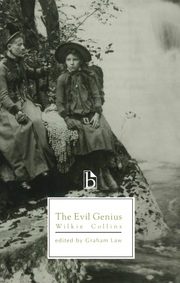
The plot of The Evil Genius (1886) focuses on a seemingly respectable middle-class marriage which falters when the husband, Herbert Linley, becomes infatuated with his daughter’s governess, the orphaned Sydney Westerfield. His wife, Catherine, is made aware of the situation following the interference of her stickybeak mother, the eponymous Evil Genius.
Although initially reasonable and rational, Catherine becomes furious when Herbert proposes setting up home with his mistress and taking their daughter Kitty to live with them. She whisks Kitty away to live in Scotland where the marriage laws are more relaxed, and manages to obtain a divorce, thereby retaining custody of her own daughter. Like Laura Fairlie in The Woman in White, she must fight hard to resist the immense power the law has invested in her husband.
The novel in many ways is ahead of its time with a partly sympathetic portrayal of a mistress, and also of a woman who refuses to forgive her husband’s adultery. Collins’ initially radical treatment of the marriage question suddenly recoils, however, as if terrified of its own subversion. By the end of the novel, the sexual double standard is firmly upheld, and the reader is subjected to the gruesome and retrograde spectacle of a superannuated old seadog marrying an infantile and vulnerable young woman.
Just in case he hadn’t quite made his moral conservatism sufficiently clear, Collins devotes a paragraph to the authorial voice in which he declares that a husband’s adultery shouldn’t be deemed sufficient grounds for divorce. A wife’s adultery is, of course, another matter entirely. Although divorce is shown to be Catherine’s only means of recourse, Collins suggests that she should have exercised forgiveness, and presumably allowed her daughter to live apart from her in an extra-marital family. Her initial tolerance, however, is criticised the divorce court judge, and ultimately Catherine is held to be equally responsible for the marital breakdown.
Rather than supporting the traditional argument that legitimate succession was the reason for the sexual double standard, Collins instead argues that male sexual urges render monogamy an impossibility. This is an unsurprising position from a man who maintained two families simultaneously. Notwithstanding the frustration provoked by the concluding chapters, The Evil Genius is an engaging and often comical exploration of the inequitable marriage and custody laws. Although Collins ultimately defends the status quo, in so doing he exposes the very reasons why equal divorce should have been available to women in Catherine Linley’s position.
The Evil Genius by Wilkie Collins